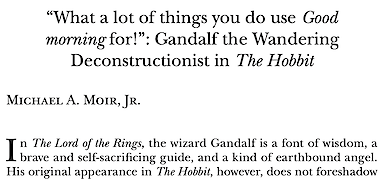
“What a lot of things you do use Good morning for!”: Gandalf the wandering deconstructionist in The Hobbit
5 October 2021 | Tolkien Studies, XVIII, 195
In The Lord of the Rings, the wizard Gandalf is a font of wisdom, a brave and self-sacrificing guide, and a kind of earthbound angel. His original appearance in The Hobbit, however, does not foreshadow the angelic origin he is later given or his reserves of wisdom; while he serves as a deus ex machina who gets Thorin and Company out of a number of tight spots early in the novel, he is a comic figure with limited powers and knowledge. For example, he cannot or will not read the Elvish writing on the blades found in the trolls’ cave, and his spells are unable to keep the wolves and goblins at bay for very long in the Misty Mountains. In The Individuated Hobbit: Jung, Tolkien and the Archetypes of Middle-earth, Timothy O’Neill claims that the Gandalf of The Hobbit is “merely an old conjurer with much dignity who could not bear looking ridiculous” (O’Neill 73). The implication in O’Neill’s description is that Gandalf is somehow ridiculous, and indeed, despite his capacity for getting his friends out of the occasional scrape, he is often clownish. Much of the humor in Tolkien’s characterization of the wizard comes not from actions or, as O’Neill would have it, affronts to his dignity, however; it comes instead from Gandalf’s frequent soliloquies on the ambiguities of spoken language. In his approach to language as an ever-shifting play of signifiers in which the signified is never quite stable, Gandalf pioneers an approach to the analysis of language that would be taken up thirty years later in the late 1960s by Jacques Derrida and his deconstructionist acolytes.…
❧